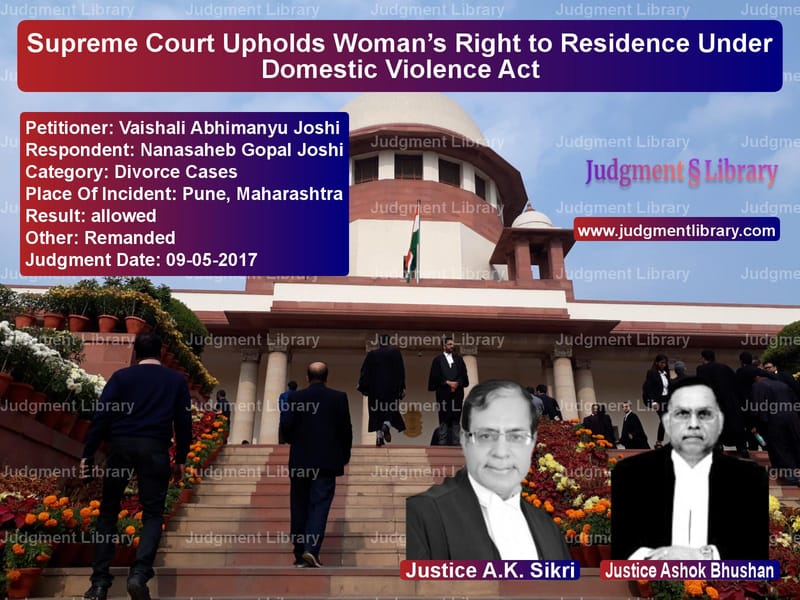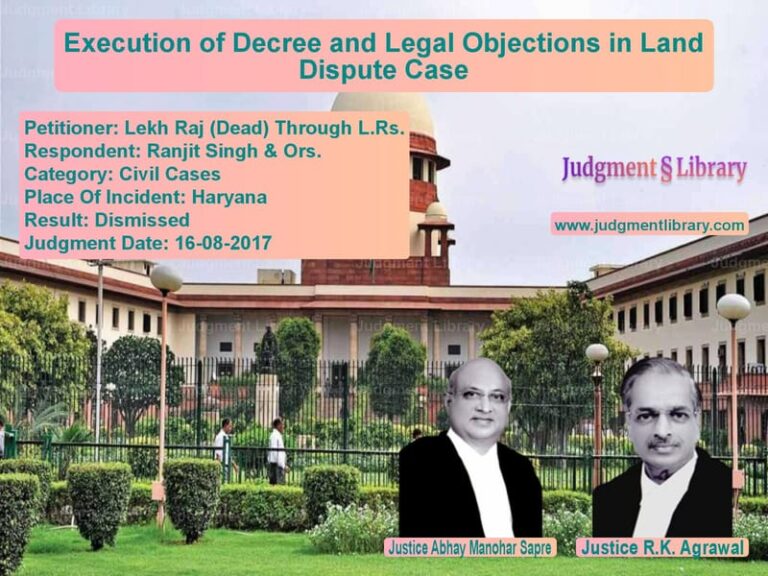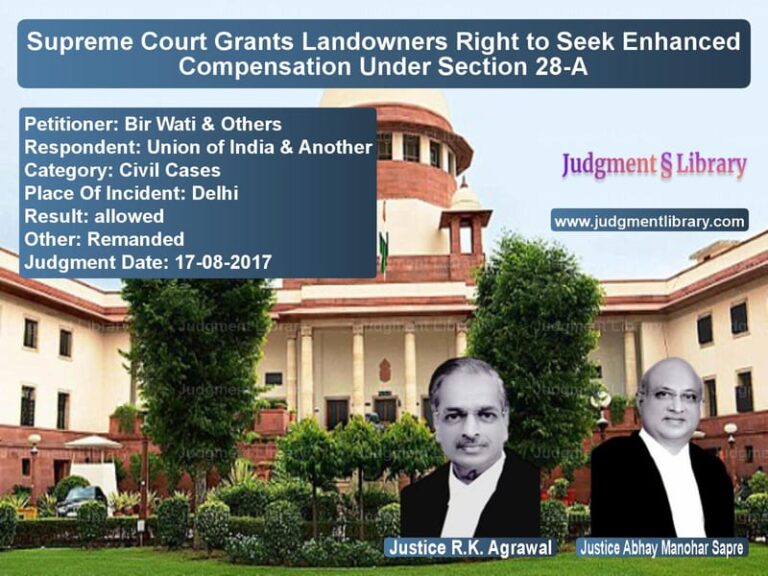Supreme Court Upholds Woman’s Right to Residence Under Domestic Violence Act
The Supreme Court of India, in its judgment dated May 9, 2017, in the case of Vaishali Abhimanyu Joshi vs. Nanasaheb Gopal Joshi, ruled on a significant issue concerning a woman’s right to residence under the Protection of Women from Domestic Violence Act, 2005. The Court examined whether a counterclaim for residence rights could be entertained in a suit for eviction filed by a father-in-law under the Provincial Small Cause Courts Act, 1887. The ruling reinforced the protections granted under the Domestic Violence Act and established that a woman facing domestic violence has the right to claim residence even in legal proceedings filed before small cause courts.
Background of the Case
The appellant, Vaishali Abhimanyu Joshi, was married to Abhimanyu Joshi and had been residing in a flat owned by her father-in-law, the respondent, since 2004. Her husband left her and moved in with his parents in 2011, and she continued to reside in the flat with their minor daughter. The respondent later served her an eviction notice and filed a suit seeking a mandatory injunction to remove her from the flat, arguing that she was a ‘gratuitous licensee.’
The appellant contested the suit, filing a counterclaim asserting her right to residence under Section 19 of the Protection of Women from Domestic Violence Act, 2005. The trial court and the district court rejected her counterclaim, ruling that the Small Causes Court had no jurisdiction to entertain it. The Bombay High Court upheld this decision, leading the appellant to file an appeal before the Supreme Court.
Key Legal Issues
The Supreme Court was tasked with resolving the following questions:
- Whether the counterclaim for residence under the Domestic Violence Act could be entertained in an eviction suit filed under the Provincial Small Cause Courts Act, 1887.
- Whether a woman facing domestic violence could claim residence rights even if she did not own the property.
- Whether the Domestic Violence Act overrides procedural limitations imposed by other civil laws.
Arguments by the Appellant
- The appellant argued that she had been subjected to domestic violence and was entitled to claim residence under Section 19 of the Domestic Violence Act.
- She contended that the suit flat was her ‘shared household’ as defined under Section 2(s) of the Domestic Violence Act, giving her the right to reside there.
- She asserted that her counterclaim was legally valid under Section 26 of the Domestic Violence Act, which allows reliefs under the Act to be claimed in any legal proceeding before a civil, family, or criminal court.
Arguments by the Respondent
- The respondent contended that he was the legal owner of the flat and had revoked the appellant’s permission to reside there.
- He argued that the Domestic Violence Act did not override the provisions of the Provincial Small Cause Courts Act, 1887, which did not permit counterclaims in eviction suits.
- He maintained that the appellant was not a tenant or co-owner and had no legal claim to the property.
Supreme Court’s Observations
The Supreme Court analyzed the interaction between the Domestic Violence Act, 2005 and the Provincial Small Cause Courts Act, 1887, making the following observations:
- The Domestic Violence Act is a special social welfare legislation intended to protect women’s rights and must be given precedence over procedural restrictions in other civil laws.
- Section 26 of the Domestic Violence Act explicitly allows reliefs under the Act to be sought in any legal proceeding, including those before small cause courts.
- The right to residence under Section 19 of the Domestic Violence Act applies irrespective of ownership or tenancy and extends to a ‘shared household’ occupied by the woman during marriage.
- Procedural limitations in small cause courts cannot override the substantive rights granted under the Domestic Violence Act.
Final Judgment
The Supreme Court set aside the Bombay High Court’s ruling and held that:
“The counterclaim filed by the appellant in the Small Causes Court is fully entertainable, and the court must adjudicate on her right to residence under Section 19 of the Domestic Violence Act.”
The Court directed the trial court to hear the appellant’s counterclaim on its merits and provide a decision based on the evidence presented.
Impact of the Judgment
This ruling has significant implications for the rights of women facing domestic violence:
- Affirmation of Residence Rights: Women can assert their right to reside in shared households even if the property is owned by in-laws.
- Expanded Jurisdiction: The judgment clarifies that relief under the Domestic Violence Act can be sought in small cause courts.
- Protection Against Arbitrary Eviction: Women cannot be evicted from their matrimonial homes without due consideration of their legal rights.
- Harmonization of Laws: The ruling reinforces that special laws like the Domestic Violence Act override conflicting procedural rules in general civil laws.
Conclusion
The Supreme Court’s ruling in Vaishali Abhimanyu Joshi vs. Nanasaheb Gopal Joshi is a landmark decision that strengthens women’s rights under the Domestic Violence Act. By allowing the appellant’s counterclaim in an eviction suit, the Court has upheld the principle that special laws enacted for the protection of vulnerable individuals should take precedence over procedural technicalities. This decision will serve as an important precedent for similar cases in the future, ensuring that women facing domestic violence have legal recourse to secure their right to residence.
Don’t miss out on the full details! Download the complete judgment in PDF format below and gain valuable insights instantly!
Download Judgment: Vaishali Abhimanyu J vs Nanasaheb Gopal Josh Supreme Court of India Judgment Dated 09-05-2017.pdf
Direct Downlaod Judgment: Direct downlaod this Judgment
See all petitions in Alimony and Maintenance
See all petitions in Property Division in Divorce Cases
See all petitions in Domestic Violence
See all petitions in Judgment by A.K. Sikri
See all petitions in Judgment by Ashok Bhushan
See all petitions in allowed
See all petitions in Remanded
See all petitions in supreme court of India judgments May 2017
See all petitions in 2017 judgments
See all posts in Divorce Cases Category
See all allowed petitions in Divorce Cases Category
See all Dismissed petitions in Divorce Cases Category
See all partially allowed petitions in Divorce Cases Category







